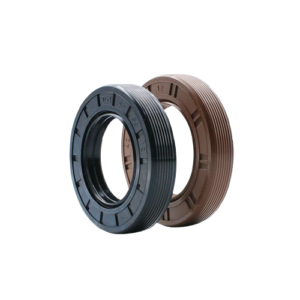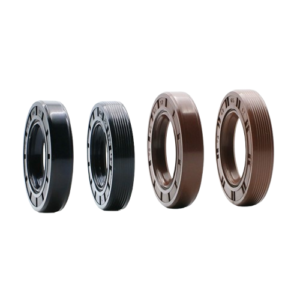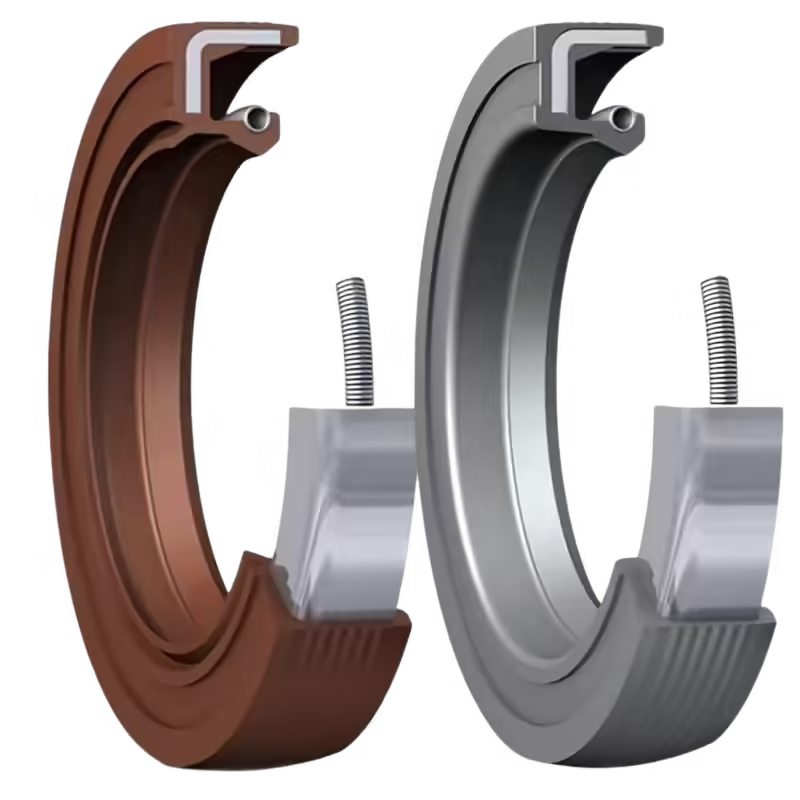What Materials Are Used for Oil Seals?
Introduction
Oil seals play a crucial role in industrial applications by preventing the leakage of lubricants and keeping contaminants out of machinery components. The choice of material for oil seals significantly impacts their performance, durability, and suitability for specific environments. This article explores the commonly used and specialty materials for oil seals, factors to consider when selecting materials, and the availability and production capabilities to meet diverse customer needs.


1. Commonly Used Materials for Oil Seals
1.1 Nitrile Rubber (NBR)
- Key Properties: Nitrile Rubber is renowned for its excellent resistance to oil, fuel, and wear. It offers good mechanical properties and is cost-effective.
- Applications: Widely used in automotive and industrial machinery where oil resistance is essential.
- Availability: Always in stock for immediate production, ensuring quick turnaround times.
1.2 Fluorocarbon Rubber (FKM/Viton®)
- Key Properties: Exhibits high-temperature resistance and superior chemical resistance, including resistance to acids, alkalis, and oils.
- Applications: Suitable for harsh environments with extreme conditions such as high temperatures and exposure to aggressive chemicals.
- Availability: Regular stock is maintained, ready for large-scale manufacturing to meet demanding industrial requirements.
2. Specialty Materials for Custom Oil Seals
2.1 Perfluoroelastomer (FFKM)
- Key Properties: Offers exceptional resistance to extreme chemicals and temperatures up to 327°C (620°F).
- Applications: Ideal for high-end or specialized industries like aerospace, chemical processing, and semiconductor manufacturing.
- Availability: Custom production only; not kept in regular stock due to its specialized nature and higher cost.
2.2 EPDM (Ethylene Propylene Diene Monomer)
- Key Properties: Excellent resistance to weathering, ozone, water, and certain chemicals like acids and alkalis.
- Limitations: Limited resistance to oils and fuels, making it less suitable for petroleum-based applications.
- Availability: Made-to-order for specific customer requirements, particularly where environmental resistance is prioritized.
2.3 Silicone Rubber
- Key Properties: Wide temperature range flexibility (-60°C to 200°C), good electrical insulation, and chemical inertness.
- Applications: Primarily used in low-pressure or food-grade environments, medical devices, and applications requiring flexibility at low temperatures.
- Availability: Limited to small-scale, custom orders to cater to specialized applications.
3. Factors to Consider When Selecting Oil Seal Materials
3.1 Operating Environment
- Temperature and Pressure: Materials must withstand the specific temperature and pressure conditions of the application.
- Chemical Exposure: Consideration of exposure to oils, fuels, chemicals, and environmental factors like ozone or UV light.
3.2 Application Requirements
- Rotational Speed: High-speed applications may require materials with better heat resistance and low friction.
- Sealing Performance: The required level of sealing efficiency and longevity can influence material choice.
- Lubricant Compatibility: Ensuring material compatibility with the type of lubricant used to prevent degradation.
3.3 Cost Efficiency and Material Availability
- Budget Constraints: Balancing material performance with cost considerations.
- Lead Time: Availability of materials can affect production timelines; in-stock materials can expedite manufacturing.
4. Material Availability and Production Capabilities
- In-Stock Materials: NBR and FKM are maintained in regular stock to facilitate immediate production and meet standard demands efficiently.
- Custom Manufacturing: Specialty materials like FFKM, EPDM, and silicone are available through custom manufacturing. Our capabilities allow us to produce seals tailored to specific requirements, even for the most demanding applications.
- Customer Assurance: We are committed to meeting diverse customer needs by offering both standard and specialized materials, ensuring optimal performance for any application.
Conclusion
Choosing the right material for oil seals is essential for ensuring the optimal performance and longevity of machinery. By understanding the properties and applications of various materials, you can make informed decisions that align with your operational requirements and budget. Our expertise in manufacturing oil seals from both commonly used and specialty materials positions us to provide the best sealing solutions for your needs. We encourage you to consult with our specialists for personalized recommendations based on your specific applications.





